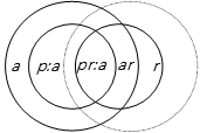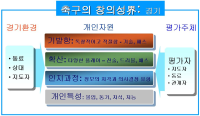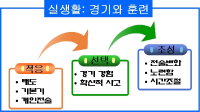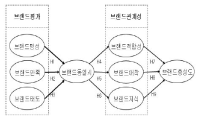PURPOSE This study was conducted to estimate the tendency of psychological factors influencing cycling performance by analyzing the characteristic factors of athlete reputation in the news big-data. METHODS To explore the psychological factors influencing cycling performance, an open questionnaire was conducted on 82 cyclists, and Inductive Content Analyses was performed. Overall, 89,520 news articles were collected through BIGKinds, and forming factors of athlete reputation were derived through LDA topic modeling analysis and inductive categorization. Through regression analysis, time series tendency of the factors of athlete reputation was calculated. Finally, the tendency of psychological factors to influence cycling performance was estimated based on the previously derived results in this study. RESULTS The psychological factors influencing cycling performance were found to be; emotion control, trust capital, cognitive control, motivation and communications with the coach. The forming factors of athlete reputation was found to be; reporting of the sports event, infrastructure creation, analysis to performance, moral issue, social environmental changes and sports gossip. The time series tendency of the forming factors of athlete reputation was found to include the categories of Hot, Warm, Cool and Cold. The psychological factors influencing cycling performance are estimated to expand to exercise performance and moral intelligence. CONCLUSIONS The results of this study suggest that the discussion of psychological factors influencing cycling performance extends not only to exercise performance, but also to moral intelligence, reflecting the socio-cultural context in the discussion of performance.

Purpose The purpose of this study was (1) to analyze judges’ evaluation on rhythmic gymnastics performance by applying generalizability theory and (2) to suggest recommendations to improve judges' rating. Methods Data were 34 players’ scores from Senior Part at 29th KGA President’s Cup National Rhythmic Gymnastics Championship in Korea. Difficulty and execution scores in ball, clubs, hoop and ribbon event were analyzed. Analysis models containing components of area and reputation rank were designed and multivariate generalizability theory were used for analysis. Results The G-study results showed (1) that the error source about players has more significant impact to evaluation than other error sources in analysis model containing components of only player and judge, (2) that the error source about players has more significant impact to evaluation than other error sources in analysis model adding components of area, but the error source about area has more significant impact to evaluation of clubs event than other error sources, (3) that the error source about players has more significant impact to evaluation than other error sources in analysis model adding components of reputation rank, but the error source about reputation rank has more significant impact to evaluation of hoop event than other error sources in analysis model adding components of area. The D-study results showed generalizability coefficient was stable in analysis model without components of area and reputation rank, but generalizability coefficient in analysis model containing components of area and reputation rank not stable in some event. Conclusion Recommendations for improving judging were discussed.




The purpose of this study was to explore a framework of understanding football performance. Researcher review was conducted to organize perspectives for football performance and drew implications as well as drift of football performance based on intelligence approach. Discussions for intelligence had been proceeded in concepts of learning ability, multiple intelligence, successful intelligence, and moral intelligence. Discussions of football performance approaches fitness, skill, and strategies in traditional intelligence aspects. The multiple intelligence perception discusses perspective, mentality, body, and analysis. The successful intelligence perspective deals with creativity, practical intelligence, and football talents. However, specific discussions for moral intelligence have not been progressed yet. FIFA’s social responsibility project and UEFA’s RESPECT campaign reflect that the discussions of football performance develops in a way of the moral intelligence. In European football, issues regarding value, such as RESPECT and against Racism, are currently emerging. Considering the change in the European football, the global football leagues will share the issues related to value in the near future. Given the fact that discussion for intelligence had been proceeded learning ability, multiple intelligence, successful intelligence, and moral intelligence, the moral intelligence will be a main concern in the further football performance discussion. The moral intelligence will be incorporated into football performance evaluations soon. Furthermore, teams and players will strive to place efforts in order for pursuing value and reputation as factors of performance.







This study is aimed at identifying the relationship among brand evaluation, brand identification, brand relationship, and brand loyalty towards professional baseball title sponsors in an empirical manner. The target of this study is 'Korea Yakult,' a baseball title sponsor in 2014. A survey was conducted on 377 home crowd members of Nexen, Doosan, LG and SK based in metropolitan regions. Sampling method was Convenience Sampling Mode, and questionnaire has been structured to be self-administerd type. SPSSWIN Ver. 21.0 and AMOS 18.0 have been used for data processing. The findings are as follows. First, the brand reputation had a significant impact on brand identification. Second, the brand satisfaction had no significant impact on brand identification. Third, the brand attitude had a significant impact on brand identification. Fourth, the brand identification had a significant impact on brand suitability. Fifth, the brand identification had a significant impact on brand attachment. Sixth, the brand identification had a significant impact on brand knowledge. Seventh, the brand suitability had a significant impact on brand loyalty. Eighth, the brand attachment had a significant impact on brand loyalty. Ninth, the brand knowledge had a significant impact on brand loyalty.

This study conducted to explore K-League (Korea Professional Football League) referees’ psychological experience and coping strategies just after the moment of wrong judgment. Open-ended questionnaire were conducted on 35 full-time referees who participated in the K-League winter training camp. The data were categorized by inductive content analysis. The results were as follows. Psychological experience yielded 45 raw data points, which were based on the following 10 sub categories; increased anxiety, rumination wrong judgment, concern about reprimand, and feeling apologetic; and four general categories including, psychological fragmentation, feeling helpless, concern about reputation, and acknowledgment of wrong judgment. Thus, K-league referees experience a psychological turbulence just after the moment of the bad calls and worsen feelings of helplessness about the wrong decisions. Also, K-league referees worry about further disadvantages following the misjudgement and admit their bad calls feeling sorry for teams and athletes who were in the incidents. Coping strategies yielded 55 raw data points from which the following categories were identified 11 sub categories; increasing concentration, attempting to forget wrong judgment, apologizing on wrong judgment, and change in thinking; and four general categories including, emotional self-support, avoiding situation, correcting the error and thinking, and changing of refereeing approach. Therefore, K-league referees enhance their concentration in order to not reoccur wrong judgement after the moment of the mistakes and try to forget the incidents of wrong judgement. Also, K-league referees apology to the teams and athletes who experienced the bad calls and make efforts to correct the mistakes if possible. Moreover, K-league referees try to modify a criteria of judgement in order to manage aftereffects of wrong judgement and make decisions correctly by approaching the scenes of the wrong judgement. The study emphasizes the importance of referee psychological stability on the field and the need for psychological support. The study is expected to encourage further research on sports referees in Korea to ensure they receive appropriate psychological support.